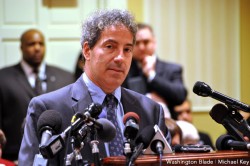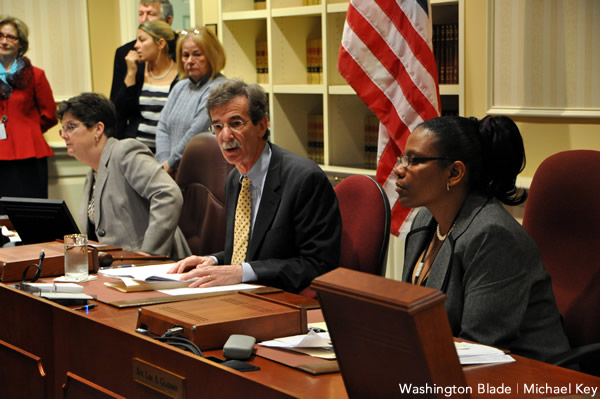Local
Md. Senate hearing on marriage draws hundreds
Governor, Baltimore mayor testify in favor of bill

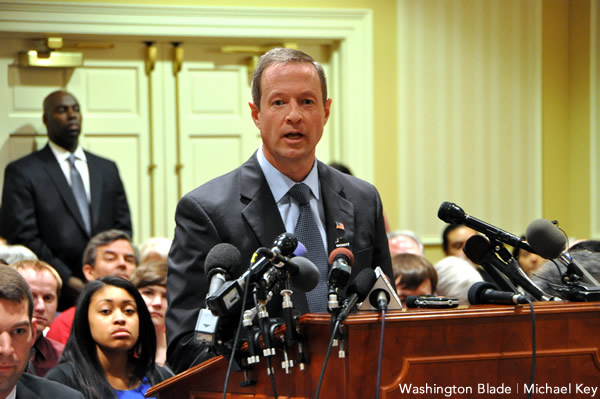
Gov. Martin O'Malley testifies before the Senate Judicial Proceedings Committee Tuesday in favor of the Civil Marriage Protection Act. (Washington Blade photo by Michael Key)
ANNAPOLIS, Md. — Over the course of four hours on Tuesday, opponents and supporters of same-sex marriage delivered compelling testimony before a Maryland Senate committee in hopes of swaying lawmakers on a landmark bill.
The Maryland Senate Judicial Proceedings Committee heard testimony on the Civil Marriage Protection Act throughout the afternoon on the last day of January, as lawmakers, experts, clergy and regular citizens from both sides of the issue shared their feelings on the bill at two minutes a piece.
Gaithersburg resident Stephanie Kreps arrived early to the hearing, proudly wearing a ‘Marylanders for Marriage Equality’ sticker to show her support for the bill as the mother of a gay son.
“It’s simple to me,” Kreps told the Blade. “I have rights that my gay son doesn’t have, and I want those rights for him and all other gay people.”
Kreps was looking forward to hearing the testimony of the bill’s supporters and said she was hopeful for the bill’s prospects considering the Governor’s support this year, and the growing trend toward supporting marriage for same-sex couples in Maryland.
The first witness to testify in favor of the bill was Maryland Gov. Martin O’Malley, who has made the bill part of his 2012 legislative agenda. O’Malley, who had at one time hesitated to support extending full marriage rights to gay couples, has become a proponent of the legislation.
“As you know we already recognize civil marriages that come from other states,” Gov. O’Malley said during his brief testimony, “the civil marriage equality bill draws upon the lessons that we have learned from these other states.”
“This bill balances an individual’s civil marriage rights with the important protections of religious freedoms for all,” O’Malley continued. “And because it protects both of these inalienable rights, it is supported by a broad coalition of Marylanders, which includes clergy, community leaders, faith-based organizations, civil rights groups and those who hold the most important title of all in our democracy, and that title is citizen.”
O’Malley was followed by gay Sen. Richard Madaleno who spoke from the heart about his love for his partner and raising a child, and relayed a story about a walk with his young daughter that expressed the very essence of family.
“We were picking flowers along the way, and she was picking buttercups and dandelions,” Madaleno said. “As she picked a few of the flowers, and went on to pick more, she handed me a little bouquet, and said ‘daddy will you hold my wishes for me?’” When he asked her what she meant, she explained. “She said ‘This is a wishing flower, you blow on it, and you see where your wishes go.’”
“I don’t know why people fall in love, I don’t know exactly why I have fallen in love with Mark as opposed to someone else, but I have, and together we have formed a family, and that family includes children.”
Following Madaleno were Democratic Sens. Jamie Raskin and Robert Garagiola and Republican Sen. Allan Kittleman, as well as Attorney General Douglas Gansler (video below courtesy GoodAsYou), all of whom urged passage of the bill.
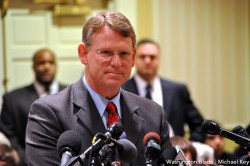
Sen. Kittleman broke ranks with Republicans to support the bill. (Washington Blade photo by Michael Key)
Kittleman, who spoke about his father’s work in the civil rights movement, said he feels so strongly about the legislation because “I really do believe it’s about family, it’s about liberty, it’s about equality.”
“I remember my dad telling me years later that when he was fighting for the civil rights movement, and integration in the public schools in Howard County, and he was talking to people who were opposed to it, especially school board members, the would say things like ‘but you don’t know what will happen if we accept African Americans. Here’s what might happen. They’re going to do this in the hallway,’ or ‘they’ll do this in the classroom,’ or ‘they’ll cause this problem.’ Always ‘might be this’ or ‘might be that.’ What I’m urging you is don’t succumb to the mights. What my father taught me is that you don’t take away someone’s civil rights because of something that might happen. You can deal with the ‘mights’ later on. But make sure we get the civil rights done now. Make sure we get that equality for everyone in our community now.”
“You don’t say no to civil rights because you’re worried about what might happen in the future,” Kittleman concluded.
Raskin, for his part, strongly defended the religious protections in the bill, confirming that churches and church sponsored and operated facilities would be exempt from having to “lend any of its accommodations, programs, or services for the purpose of promoting a marriage it disapproves of for religious reasons.”
However, Raskin was quick to differentiate religious groups and private individuals or businesses, who have been barred in law since 2001 from discriminating against Marylanders in public accommodation because of sexual orientation.
http://www.youtube.com/watch?v=z0aThYUXJ64
Sen. Raskin defends the marriage bill.
Also testifying in favor of the bill was Baltimore Mayor Stephanie Rawlings-Blake.
“I believe that all couples regardless of their sexual orientation, want their children protected under the law,” Rawlings-Blake testified. “Please don’t be mistaken, this bill is about more than those rights, it’s also about civil rights and about equality under the law.”
Both sides were given two hours each to present their witnesses in four parts — the first and third hours in support of the law, and the second and fourth in opposition.
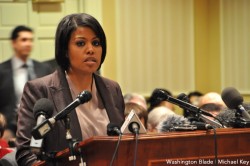
Baltimore mayor Stephanie Rawlings-Blake testifies in favor of the bill. (Washington Blade photo by Michael Key
All told, more than 75 citizens delivered testimony both for and against the bill over a period of four and a half hours. Opposition to the bill ran from the colorful — like local same-sex marriage hearing mainstay Minister Leroy Swailes, who produced groans even from other opponents of the bill — to the passionate; while support ran from the clinically factual to the deeply moving — such as the ardently supportive mother of a lesbian daughter, Penny Nichols.
The supporters also included dozens of same-sex couples raising children, parents of gay children and straight children raised by same-sex couples, all in an attempt to counter arguments by the opposition that same-sex marriage would be detrimental to the development of children in Maryland.
Also testifying in support of the law in the first hour were gay veteran and law enforcement officer Irene Huskens of Fort Washington; president of the Maryland AFL-CIO union, and father of a gay child, Fred Mason; gay federal worker and long-time Maryland resident Candy Holmes; supportive Unitarian-Universalist minister Rev. John Crestwell; and David Rocah, staff attorney at the ACLU of Maryland.
One of the questions that Rocah fielded from committee member Sen. Joseph M. Getty after his testimony dealt with whether the law discriminates against close family members that wish to marry “because of genetics, and the familial relationship is because of genetic relationships.”
“It’s long-standing policy in Maryland to prohibit marriage between people of a particular familial relation,” Rocah answered. “They don’t all relate with genetics. Maryland has prohibited relationships between stepfathers or stepmothers, they’re not genetically related. Different states have different degrees of familial relationships in which marriage is prohibited. I don’t see the issue of discrimination that you’re referring to.”
Both the hearing room itself and an overflow room were filled to capacity through much of the hearing, producing an electric and anxious atmosphere among those in attendance. Same-sex marriage supporters sat next to opponents, making it difficult in many cases to distinguish who was there in favor of and who was there against. Most in attendance could only be differentiated by the round stickers given out by both the proponents and opponents — which themselves were similar in shape, size and coloring.
Among those in the audience in opposition to the bill was Maryland resident Ruby Wilson who says she has concerns about the bill because she believes it will harm children.
“I believe children are being affected already in Massachusetts with the bill that’s there,” Wilson — who says as a Catholic she does not believe gays should adopt children — told the Blade. “In the fifth grade they’re given a book …and it tells all the ways that you can enjoy yourself as a homosexual. I don’t want my grandchildren to have that.”
“Also they said that there’s going to be a conscience clause in this bill for Christians,” Wilson continued. “Well, they just take that to court, and the courts just take it out. And then where are we at? We just have no protection.”
“I’m totally against it,” Wilson said, though she is not opposed to civil unions for same-sex couples. “I’m just opposed to redefining marriage.”
Wilson’s feelings about “redefining marriage” were echoed by Maryland resident Edna Kersey.
“I think that traditionally that is what marriage defines, is a man and a woman, and I feel that they should find another term for the same-sex marriage, or the same-sex union, so that it not tamper with the name that we so long stood on,” Kersey told the Blade. “That’s what our foundation is built on, the tradition marriage, which is between a man and a woman. So its not the union itself, it is the name or the title that they are trying to change.”
However, Kersey tells the Blade that she is not in support of Civil Unions, unlike Wilson.
In the second hour, the opposition first presented Maryland Family Alliance president Pastor Dereck McCoy, who set a cordial, respectful tone.
“Regardless of the tenuous debate that we’re in,” McCoy said, “I think we need to understand that Marylanders are separated on this issue, but it’s a deep and passionate thing in the root and the heart of the communities and many people’s lives.”
However, regardless of the result of the vote, McCoy said the definition of marriage would not change for opponents. “People will still feel that marriage should be defined as one man, and one woman. That does not change.”
Following McCoy was Maryland Baptist ministers Rev. Dr. John Lund, and Rev. Dr. Nate Thomas, as well as Presbyterian pastor Bob Borger, former mega-church pastor Joel Peebles — who recently lost a court battle over control over his Jericho City of Praise Ministry — as well as some Catholic voices such as Pastor of Our Lady of Perpetual Help, Father Eric Arnold, and Maryland Catholic Conference’s Mary Ellen Russell.
“Among those who testified last year, there were some who seemed to bring hatred and prejudice into the hearing,” said Father Arnold. “In fact, the Baltimore Sun reported that at least one Senator changed his stance on the bill because of the demonization that he sensed in some of the testimony. So as I speak to you today, I ask you to please not lump my testimony in with those who may be driven by hatred or prejudice.”
Father Arnold assured the committee that he, and many of those testifying with him, were there with good will.
“We are here today simply to speak on behalf of the wonderful and unique institution of marriage as it exists in between one man and one woman,” he continued, saying that preferring such unions was ‘not prejudice.’ “We ask you to recognize that the family based on a marriage of a man and a woman is a natural institution that is prior to the state.”
Mary Ellen Russell, in the adjacent audio file, seemed to come out both in favor and against civil unions during her testimony (hear her testimony at GoodAsYou.org).
The testimony was concluded by an attorney specializing in representing churches and ministers, Erika Cole, the Beckett Fund for Religious Liberty’s Eric Baxter, and the anti-gay Alliance Defense Fund’s Brian Raum (hear his testimony at ThinkProgress.org).
Several times throughout the proceedings — both the hearing room and the overflow room where the testimony was projected upon two large screens at the fore of the room — parts of the audience erupted into cheers and applause in response to testimony given, often soliciting a stern reminder from committee chair Sen. Brian E. Frosh that for the sake of time, applause was to be held until the end, in recognition of the number of witnesses to get through.
Leading the supporters of the bill to testify in the third hour were the Human Rights Campaign’s Sarah Warbelow, who gave a statement about the way same-sex couples in Maryland were treated unequally in terms of property ownership, child rearing, healthcare and inheritance.
“Hundreds of laws cover the benefits, rights, and obligations of spouses,” Warbelow told the committee. “When same-sex couples cannot participate in marriage, their families are more vulnerable.”
Following Warbelow were Baltimore Presbyterian pastor Andrew Foster Connors, Baltimore’s Rabbi Elyssa Sachs Kohen, Doug Prouty of the Montgomery County Education Association, Henry Dugan president of the Maryland State Bar Association, along with State Bar member Craig Little, Daphne Mcclellan executive director of the National Association of Social Workers Maryland chapter, Rev. Madeleine Beard coordinator of public policy for the Episcopal Diocese of Maryland, MCC Bishop Rev. Darlene Garner and Rev. Jill McCrory Chair of Association of Welcoming and Affirming Baptists.
They were joined by social workers and radio hosts Bob and Lori Hollander, Progressive Maryland Interim Executive Director Kate Planco Waybright, and Ezekiel Jackson political organizer for 1199 SEIU, who said, “as a heterosexual African American man, I’m here for equality.”
http://www.youtube.com/watch?v=qfBGyIhtWfw
A.G. Gansler testifies
Opposition in the fourth hour brought some of the most curious testimony of the day. Openly gay father Doug Mainware lamented the lack of a mother in the lives of his children, and cited his conservative beliefs and “thinking deeply about this issue in a reasoned way,” as impetus for coming to oppose the bill after previously supporting it. Senator Raskin, intrigued by the curiosity of the situation, asked Mainware, “how do you undermine an institution by bringing more people into it?”
Mainware believes that the term belongs specifically to the union between a man and a woman, but did admit he is not opposed to civil unions.
Mainware was followed by a cordial Rob Lucas and anti-gay group MassResistance’s Brian Camenker, who warned lawmakers that parents will lose control over what children are taught in school if marriage is extended to same-sex couples, and even warned about a particular case, frequently cited by same-sex marriage foes, in which David Parker was arrested for opposing a pro-gay curriculum in his child’s school.
Also opposing in the fourth hour were Pastor Victor Kirk, Maryland Gubernatorial candidate Corrogan Vaughn, Ruth Jacobs, Silver Springs pastor Robert Nelson, leader of Maryland Marriage Savers Mike McManus, Pierre Bynum, Chaplain at the Family Research Council, Martha and Ed Jenkins, Todd Braun, the colorful Minister Leroy Swailes, and Grace Harley who opposes the bill but — after reciting from the biblical book of Matthew — proclaimed, “I once lived as a man, I once married a woman in 1978, I’ve been before you many times.”
After the final round of opponents, several prominent supporters were able to give their testimony, including Kate Oliver of the group COLLAGE which brings together the children of gay parents, Rev. Lisa Ward, Liz Seaton of the National Center for Lesbian Rights, Rev. MacArthur Flournoy who had led the clergy rally earlier in the day, president of the Maryland Gay and Lesbian Chamber of Commerce Mark Yost and Episcopal priest Rev. Kathleen Corbet Welsh, a happily partnered lesbian for many decades.
Among these prominent voices was Equality Maryland executive director Carrie Evans, who echoed the sentiments of all of the heartfelt statements that had preceded hers.
“Today you have heard from individuals and families who represent the wonderful and cherished diversity of our great state,” Evans told the committee. “Each person has shared the sometimes personal and touching reasons why you should vote to end marriage discrimination.”
Also in this group was memorable mother of a lesbian daughter at Drexel University, Penny Nichols, who proclaimed “As a devoted mother, I knew my daughter was gay since the second grade.”
“When she finally said to me at the age of 16, ‘mom I’m gay,’ I shocked her with my response, for I hugged my daughter, and I said ‘I’m so proud of you for being your authentic self,” Nichols said. “I want my lesbian daughter to live in a just world.”
“The only obstacle my lesbian daughter should face is her mother’s rule that she cannot marry until after she receives her degrees,” Nichols continued. “I am not gay, but I birthed a gay daughter. I don’t know who’s louder or prouder — she or I — but I will tell you, I think I am outer and prouder!”
After the completion of the last supporters, the committee agreed to exhaust the speaker’s list by giving those remaining — both supporting and opposing — one minute each to add their own testimony.
http://www.youtube.com/watch?v=o-Tsr7rz9Og
District of Columbia
Kennedy Center renaming triggers backlash
Artists who cancel shows threatened; calls for funding boycott grow

Efforts to rename the Kennedy Center to add President Trump’s name to the D.C. arts institution continue to spark backlash.
A new petition from Qommittee , a national network of drag artists and allies led by survivors of hate crimes, calls on Kennedy Center donors to suspend funding to the center until “artistic independence is restored, and to redirect support to banned or censored artists.”
“While Trump won’t back down, the donors who contribute nearly $100 million annually to the Kennedy Center can afford to take a stand,” the petition reads. “Money talks. When donors fund censorship, they don’t just harm one institution – they tell marginalized communities their stories don’t deserve to be told.”
The petition can be found here.
Meanwhile, a decision by several prominent musicians and jazz performers to cancel their shows at the recently renamed Trump-Kennedy Center in D.C. planned for Christmas Eve and New Year’s Eve has drawn the ire of the Center’s president, Richard Grenell.
Grenell, a gay supporter of President Donald Trump who served as U.S. ambassador to Germany during Trump’s first term as president, was named Kennedy Center president last year by its board of directors that had been appointed by Trump.
Last month the board voted to change the official name of the center from the John F. Kennedy Memorial Center For The Performing Arts to the Donald J. Trump And The John F. Kennedy Memorial Center For The Performing Arts. The revised name has been installed on the outside wall of the center’s building but is not official because any name change would require congressional action.
According to a report by the New York Times, Grenell informed jazz musician Chuck Redd, who cancelled a 2025 Christmas Eve concert that he has hosted at the Kennedy Center for nearly 20 years in response to the name change, that Grenell planned to arrange for the center to file a lawsuit against him for the cancellation.
“Your decision to withdraw at the last moment — explicitly in response to the Center’s recent renaming, which honors President Trump’s extraordinary efforts to save this national treasure — is classic intolerance and very costly to a non-profit arts institution,” the Times quoted Grenell as saying in a letter to Redd.
“This is your official notice that we will seek $1 million in damages from you for this political stunt,” the Times quoted Grenell’s letter as saying.
A spokesperson for the Trump-Kennedy Center did not immediately respond to an inquiry from the Washington Blade asking if the center still planned to file that lawsuit and whether it planned to file suits against some of the other musicians who recently cancelled their performances following the name change.
In a follow-up story published on Dec. 29, the New York Times reported that a prominent jazz ensemble and a New York dance company had canceled performances scheduled to take place on New Year’s Eve at the Kennedy Center.
The Times reported the jazz ensemble called The Cookers did not give a reason for the cancellation in a statement it released, but its drummer, Billy Hart, told the Times the center’s name change “evidently” played a role in the decision to cancel the performance.
Grenell released a statement on Dec. 29 calling these and other performers who cancelled their shows “far left political activists” who he said had been booked by the Kennedy Center’s previous leadership.
“Boycotting the arts to show you support the arts is a form of derangement syndrome,” the Times quoted him as saying in his statement.
District of Columbia
New interim D.C. police chief played lead role in security for WorldPride
Capital Pride says Jeffery Carroll had ‘good working relationship’ with organizers
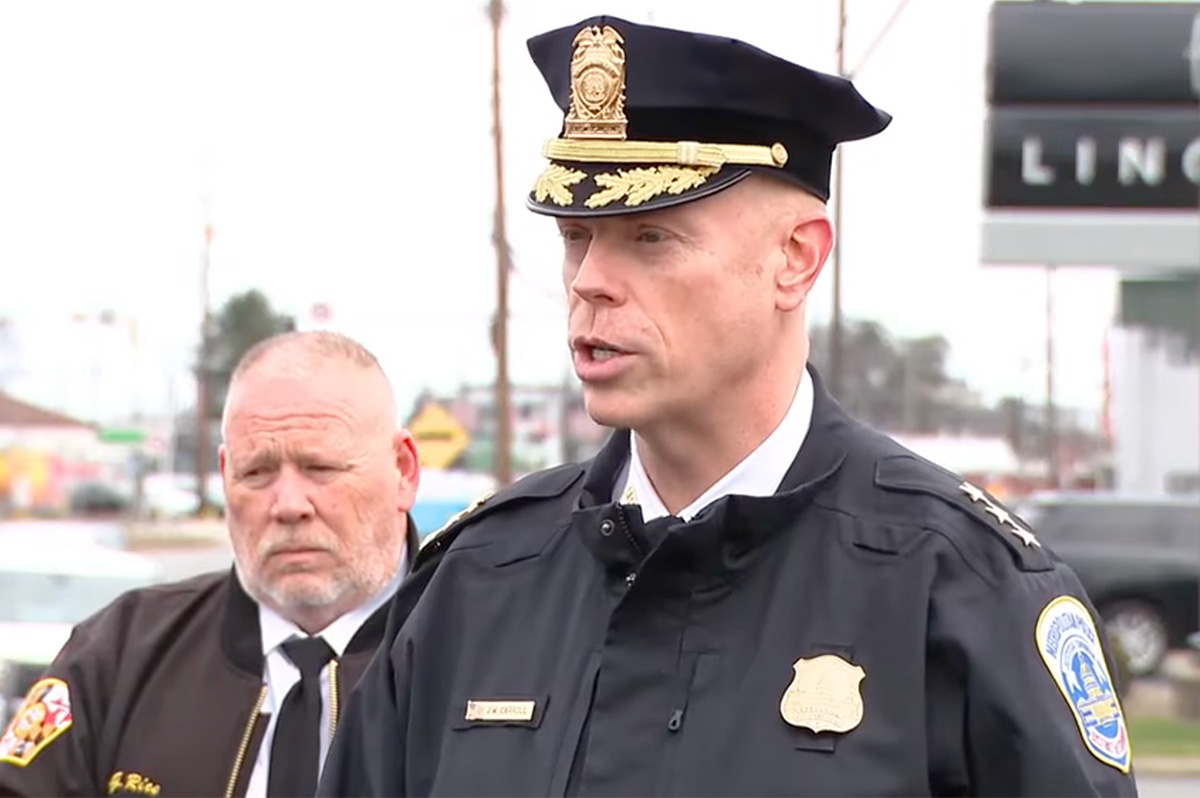
Jeffery Carroll, who was named by D.C. Mayor Muriel Bowser on Dec. 17 as the city’s Interim Chief of Police, played a lead role in working with local LGBTQ community leaders in addressing public safety issues related to WorldPride 2025, which took place in D.C. last May and June
“We had a good working relationship with him, and he did his job in relation to how best the events would go around safety and security,” said Ryan Bos, executive director of Capital Pride Alliance.
Bos said Carroll has met with Capital Pride officials in past years to address security issues related to the city’s annual Capital Pride parade and festival and has been supportive of those events.
At the time Bowser named him Interim Chief, Carroll had been serving since 2023 as Executive Assistant Chief of Specialized Operations, overseeing the day-to-day operation of four of the department’s bureaus. He first joined the D.C. Metropolitan Police Department in 2002 and advanced to multiple leadership positions across various divisions and bureaus, according to a statement released by the mayor’s office.
“I know Chief Carroll is the right person to build on the momentum of the past two years so that we can continue driving down crime across the city,” Bowser said in a statement released on the day she announced his appointment as Interim Chief.
“He has led through some of our city’s most significant public safety challenges of the past decade, he is familiar with D.C. residents and well respected and trusted by members of the Metropolitan Police Department as well as our federal and regional public safety partners,” Bowser said.
“We have the best police department in the nation, and I am confident that Chief Carroll will meet this moment for the department and the city,” Bowser added.
But Bowser has so far declined to say if she plans to nominate Carroll to become the permanent police chief, which requires the approval of the D.C. City Council. Bowser, who announced she is not running for re-election, will remain in office as mayor until January 2027.
Carroll is replacing outgoing Chief Pamela Smith, who announced she was resigning after two years of service as chief to spend more time with her family. She has been credited with overseeing the department at a time when violent crime and homicides declined to an eight-year low.
She has also expressed support for the LGBTQ community and joined LGBTQ officers in marching in the WorldPride parade last year.
But Smith has also come under criticism by members of Congress, who have accused the department of manipulating crime data allegedly showing lower reported crime numbers than actually occurred. The allegations came from the Republican-controlled U.S. House Oversight Committee and the U.S. Justice Department
Bowser has questioned the accuracy of the allegations and said she has asked the city’s Inspector General to look into the allegations.
Meanwhile, a spokesperson for the D.C. police Office of Public Affairs did not immediately respond to a question from the Washington Blade about the status of the department’s LGBT Liaison Unit. Sources familiar with the department have said a decline in the number of officers currently working at the department, said to be at a 50-year low, has resulted in a decline in the number of officers assigned to all of the liaison units, including the LGBT unit.
Among other things, the LGBT Liaison Unit has played a role in helping to investigate hate crimes targeting the LGBTQ community. As of early Wednesday an MPD spokesperson did not respond to a question by the Blade asking how many officers are currently assigned to the LGBT Liaison Unit.
Arts & Entertainment
2026 Most Eligible LGBTQ Singles nominations
We are looking for the most eligible LGBTQ singles in the Washington, D.C. region.

Are you or a friend looking to find a little love in 2026? We are looking for the most eligible LGBTQ singles in the Washington, D.C. region. Nominate you or your friends until January 23rd using the form below or by clicking HERE.
Our most eligible singles will be announced online in February. View our 2025 singles HERE.
-

 Photos4 days ago
Photos4 days agoThe year in photos
-

 Sponsored3 days ago
Sponsored3 days agoSafer Ways to Pay for Online Performances and Queer Events
-

 District of Columbia2 days ago
District of Columbia2 days agoTwo pioneering gay journalists to speak at Thursday event
-

 a&e features2 days ago
a&e features2 days agoQueer highlights of the 2026 Critics Choice Awards: Aunt Gladys, that ‘Heated Rivalry’ shoutout and more

